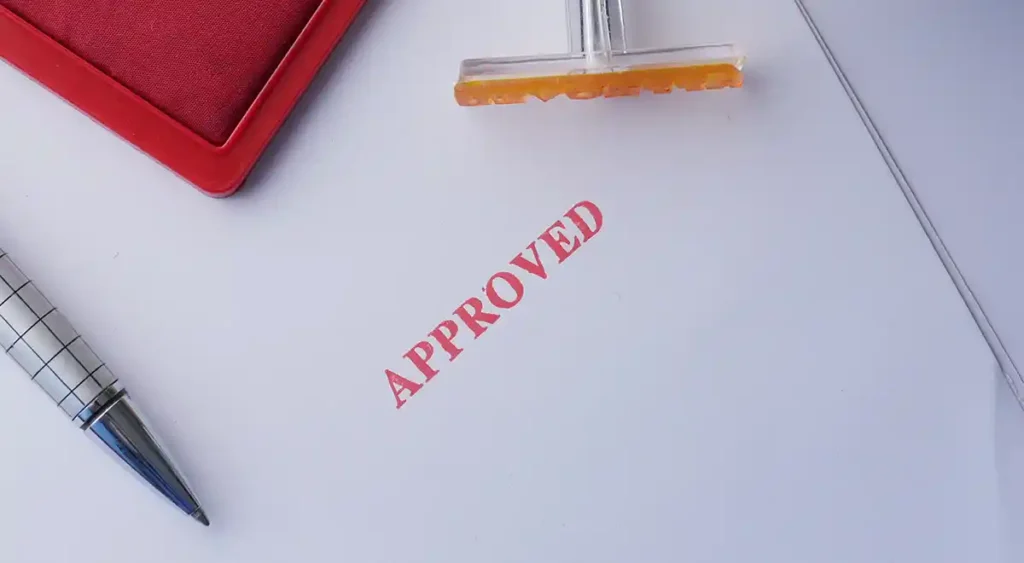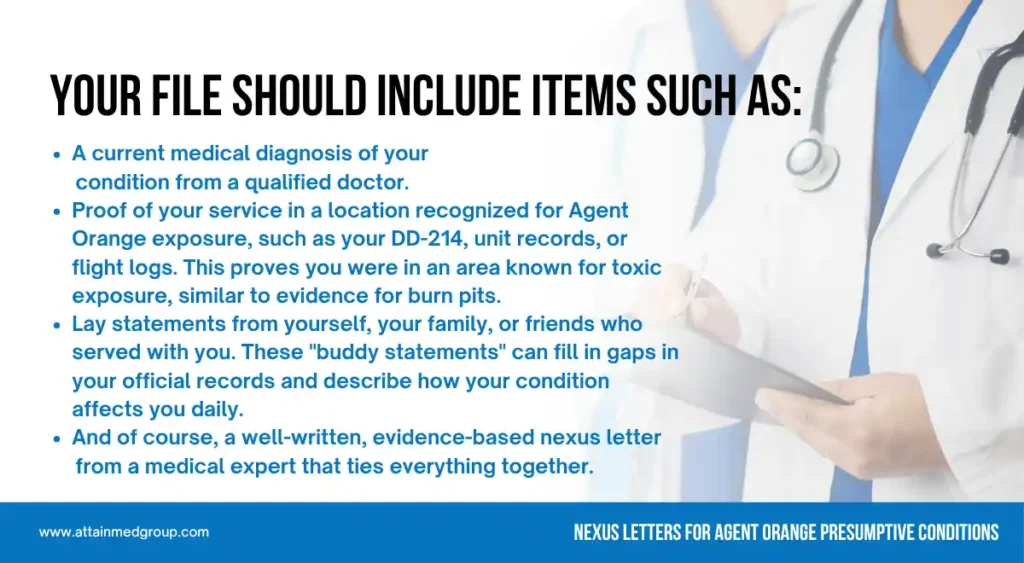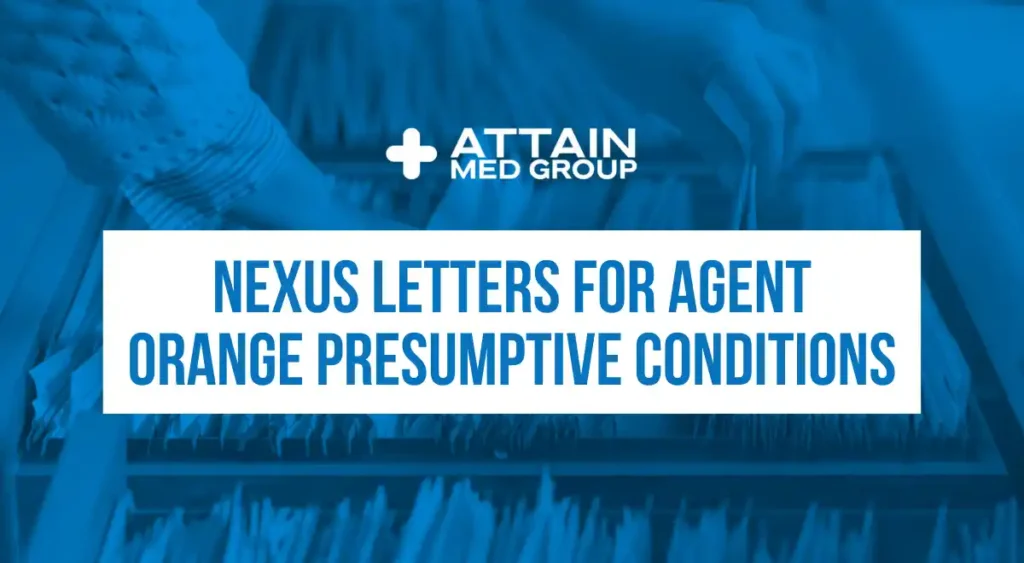You thought your Agent Orange claim would be straightforward. The government says your condition is presumptive, so you should be good to go, right? But then the denial letter arrives, and you’re left confused and frustrated. The reality is that even with presumptives some Agent Orange VA claims need a nexus letter. Learn when and what evidence it should include to finally get the disability benefits you deserve.
Many veterans are shocked to discover that a presumptive label is not a golden ticket to VA disability benefits. It’s supposed to make the disability claim process easier, but a small detail or a missing piece of paper can derail your entire VA disability claim. That is why understanding this one key piece of evidence is so critical, because even with presumptives some Agent Orange VA claims need a nexus letter. Learn when and what evidence it should include, and you can change the outcome of your claim.

What Are Agent Orange Presumptive Conditions Anyway?
Let’s break down what a presumptive condition is supposed to do for you. It means the VA has acknowledged a direct link between certain illnesses and exposure to herbicides like Agent Orange. You don’t have to prove that your military service caused your condition, which simplifies the path to receiving disability compensation.
The idea is simple. If you served in a specific location during a specific time and later developed one of these diseases, the VA presumes your service and Agent Orange exposure caused it. You just have to show you were there and have a current diagnosis.
This framework was strengthened by the PACT Act, which expanded the presumptive list and added more qualifying locations. For a presumptive claim to be approved, the VA is supposed to confirm three key elements for service connection.
- You have a current diagnosis of a condition on the presumptive list.
- You served in a location and time frame recognized for Agent Orange exposure or other toxic exposure.
- The condition is on the VA’s official list of Agent Orange presumptive conditions.
When these three things line up, your disability claim should be approved. This established service connection means you can receive health care and VA disability compensation. However, as many veterans have learned, the claims process does not always work that way.

Why a Presumptive Claim Might Still Get Denied
It’s infuriating to get a denial for something that should be automatic. You check all the boxes, but the Veterans Affairs office still says no. This happens more often than you might think, and it usually comes down to a few common reasons.
Trouble Proving Your Presence
The VA might agree you have one of the orange presumptive conditions. But they might argue your records don’t clearly show you were in a qualifying location like a specific military base in Vietnam or Thailand. A clerical error on your DD-214, missing unit records, or vague descriptions of your duties can become a major roadblock to getting VA benefits.
They might say your records only place you at a large military base in Thailand but not specifically on the base perimeter where herbicide use is presumed. This is when you have to dig deeper for proof. This is where lay evidence, like buddy statements from fellow service members who remember you being there, can make a huge difference in your VA disability claims.
Your Diagnosis Seems Unclear or Too Mild
Sometimes, the issue isn’t your service record but your medical records. The VA might argue that your diagnosis is not definitive or that your condition is not chronic, even if it is on the Agent Orange presumptive list. They may even try to say your symptoms are too mild to warrant a disability rating or that you are not eligible for individual unemployability.
This is why having clear, consistent medical evidence is vital. Your medical professional needs to clearly state your diagnosis and how it impacts your daily life. A vague note in your file is not enough to fight back against a VA examiner’s opinion that seeks to downplay your disability.
The Sickness Isn’t on the Presumptive List
What if you’re certain your Agent Orange-related illness was caused by your service, but it’s not on the VA’s presumptive list? This is one of the most common and difficult situations veterans exposed to toxic chemicals face. In this case, the presumptive shortcut does not apply to you at all.
You now have the full burden of proof. You have to scientifically link your specific medical condition directly to Agent Orange exposure. This is practically impossible to do on your own, and it is a situation that absolutely requires a strong medical opinion from a medical expert.
Your Disease Appeared “Too Late”
For some presumptive conditions, like diabetes mellitus type 2, there is no time limit for when they can appear after military service. However, for others, such as chloracne, the VA wants to see it manifest within a year of exposure. If your diagnosis came years later, they might deny the claim based on this timeline.
Even for diseases without a time limit, a VA examiner might still try to argue against the service connection. They might suggest that since a condition like non-hodgkin’s lymphoma developed 30 years after service, something else must have caused it. This kind of opinion can sink a claim quickly if you don’t have powerful medical evidence to counter it.

Even with Presumptives Some Agent Orange VA Claims Need a Nexus Letter. Learn When and What Evidence It Should Include.
So, how do you fight back against these denials? How do you connect the dots for the VA when they refuse to see the link? This is where a nexus letter becomes your most powerful weapon in the VA claims process.
A nexus letter is an expert medical opinion that connects your condition to your military service. Think of it as a doctor writing a professional report on your behalf for your VA claim. It explains the “how” and “why” of your condition, providing the medical nexus the VA rater needs to approve your claim.
You need a nexus letter in a few key situations. If your condition is not on the presumptive list, you will always need one. If you’ve been denied for a presumptive condition for any of the reasons we just discussed, a strong nexus letter can overturn that denial. You also need one if you are claiming a secondary condition caused by a presumptive one, like peripheral neuropathy caused by diabetes or side effects from medication for Hodgkin’s disease.
What Makes a Strong Agent Orange Nexus Letter?
Not just any doctor’s note will do the trick. A powerful nexus letter must be written in a specific way and contain very specific information. The VA has standards for medical opinions, and if the letter does not meet them, it will likely be ignored.
Written by a Qualified Medical Professional
The letter must come from a doctor or other medical expert with the right credentials. An oncologist should write about your multiple myeloma non-hodgkin’s lymphoma. A neurologist should write about your nerve damage. The medical expert’s specialization gives their opinion weight.
It is also incredibly helpful if the doctor understands the VA disability claims process. They will know what language to use and what evidence to highlight. A doctor who has never written one of these nexus letters before might leave out crucial elements needed for VA disability compensation.
A Complete Review of Your Records
A credible nexus letter always starts with the doctor stating what they reviewed to form their medical opinion. They must list all the records they looked at, which could include your service medical records, your VA medical files, private doctor’s records, and even lay evidence. This list shows the VA that the doctor did their homework.
They did not just take your word for it. They performed a comprehensive review of your entire history to come to an informed medical conclusion. This detailed approach strengthens the credibility of the independent medical opinion provided.

A Solid Medical Rationale
This is the core of the letter. The doctor must clearly explain, in medical terms, how your exposure to Agent Orange is related to your condition. They cannot just say, “I think his service caused his disease multiple myeloma non-hodgkin’s lymphoma.”
Instead, they need to cite scientific evidence. This could include medical treatises, journal articles, or epidemiological studies that show a link between the chemicals in Agent Orange and your disease. For example, they could reference studies on TCDD dioxin, the toxic component of Agent Orange, and its link to conditions like chronic b-cell leukemia hodgkin’s disease.
Using the Right Language for the VA
The VA operates on a “standard of proof” that is different from a typical court of law. To approve a VA disability claim, the evidence must show that it is “at least as likely as not” that your service caused your condition. This means there is a 50% chance or greater.
A strong nexus letter uses this exact language. The doctor should state their conclusion using one of these phrases:
- “It is at least as likely as not that the veteran’s condition was caused by his exposure to Agent Orange.”
- “It is more likely than not…”
- “The veteran’s condition is due to his herbicide exposure.”
This specific phrasing leaves no room for doubt in the VA rater’s mind. It directly answers the question the VA needs to rule in your favor and establish a service connection for your VA disability rating. These carefully chosen words are often the difference between approval and denial.
Putting All Your Evidence Together
A nexus letter is a powerful tool, but it’s still just one part of your claim. To have the best chance of success, you need to submit a complete package of evidence that tells a clear story from start to finish. Think of it as building a case piece by piece for your VA disability.
Your complete evidence file, often submitted with a VA form, should include several components. Each piece of evidence supports the others, creating a compelling argument. A well-organized file makes the VA rater’s job easier and increases your chances of a favorable outcome.

Each document plays a specific role. Your service records put you in the right place at the right time. Your medical records prove your diagnosis. The nexus letter explains the medical connection. Together, they create a claim that is very hard for the VA to deny.
Conclusion
The path to getting your Agent Orange VA disability claim approved can be long and difficult. It feels deeply unfair when a condition the VA itself calls presumptive gets denied. But a denial is not the end of the road; it’s a sign that you need stronger evidence to support your case.
You can fight back, and you can win. Understanding when and why you might need more evidence is the first step. You now see why even with presumptives some Agent Orange VA claims need a nexus letter. Learn when and what evidence it should include, and you equip yourself with the tools to build a successful disability claim.
Do not let a bureaucratic denial stop you from getting the health care and disability compensation you earned with your military service. By gathering the right medical evidence and presenting a clear, compelling case, you can secure the VA disability benefits you rightly deserve. Remember, persistence and proper documentation are your best allies in this process.

